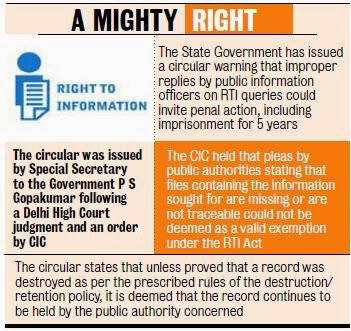Indian
Express: Kochi: Sunday, 26 April 2015.
Gone are the
days when information officers returned RTI queries with the lame excuse of
‘file missing’. In what could be termed as a major step towards ensuring proper
response to RTI queries under the RTI Act, the State Government has issued a
circular warning that improper replies by public information officers could
invite penal action, including imprisonment for 5 years. RTI activists welcomed
the circular, and opined that it would put an end to the practice of officials
purposefully hoarding important files.
Director
General of Prosecution T Asaf Ali said that public authorities could not refuse
any document, which they are legally bound to provide, with lame excuses. “If
they say that a particular document was destroyed, it is to be assumed that it
was destroyed with the malafide intention to deny access. If a document has
‘gone missing or found to be stolen’, an
FIR should be filed,” Asaf Ali said, adding that the circular would bring in a
major change in RTI activism.
The circular
was issued by Special Secretary to the Government P S Gopakumar following a
Delhi High Court judgment and an order by the Central Information Commission
(CIC). The CIC held that pleas by public authorities stating that files
containing the information sought for are missing or are not traceable could
not be deemed as a valid exemption under the RTI Act, and that pleas of missing
files tend to discourage the very objective of the RTI Act. The circular states that unless proved that a
record was destroyed as per the prescribed rules of the destruction/retention
policy, it is deemed that the record continues to be held by the public
authority concerned.
“Claims of
files missing/not traceable have no legality. It amounts to breach of the
Public Records Act - 1993, which is punishable with imprisonment up to 5 years
or fine, or both. A public authority has the duty to initiate action when a
public record is lost.
Every public
authority should prescribe the record retention schedule, and destruction of
documents should be carried out under competent administrative supervision,
with records showing that the documents were destroyed on expiry of the
retention period. The circular also asked all government institutions in the
State to formulate a record retention schedule and to ensure that records are
destroyed only in accordance with such stipulation, and also to publish the
same on the official websites.































